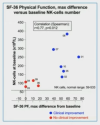Key Points
- A reduced proportion of CD16+ bone marrow NK cells at diagnosis was associated with decreased daratumumab-mediated NK-cell degranulation.
- Reduced BM CD16+ NK-cell proportion was associated with reduced likelihood of achieving MRD negativity upon daratumumab-based therapy.
Abstract
Natural killer (NK) cells are important effector cells in antibody-based immune therapies for multiple myeloma (MM) through antibody-dependent cellular cytotoxicity. Here, we used single-cell transcriptomics, flow cytometry, and functional assays to investigate the bone marrow NK-cell compartment of patients with MM at diagnosis and during treatment. We show reduced proportion of CD16+ cytotoxic NK cells in a subset of patients at diagnosis, which correlated with decreased cytokine production and NK-cell degranulation against MM cells in the presence of the anti-CD38 antibody daratumumab. In line with these findings, a low proportion of CD16+ bone marrow NK cells at diagnosis was associated with a reduced likelihood of achieving measurable (or minimal) residual disease (MRD) negativity after consolidation in patients treated with daratumumab, bortezomib, thalidomide, and dexamethasone in conjunction with autologous stem cell transplantation in the CASSIOPEIA trial. In contrast, NK-cell distribution did not predict MRD negativity in patients treated in the control arm without daratumumab. These findings highlight the impact of the bone marrow NK-cell compartment on therapeutic outcomes in patients with MM receiving immunotherapy with CD38-targeting antibodies.
Commentary


